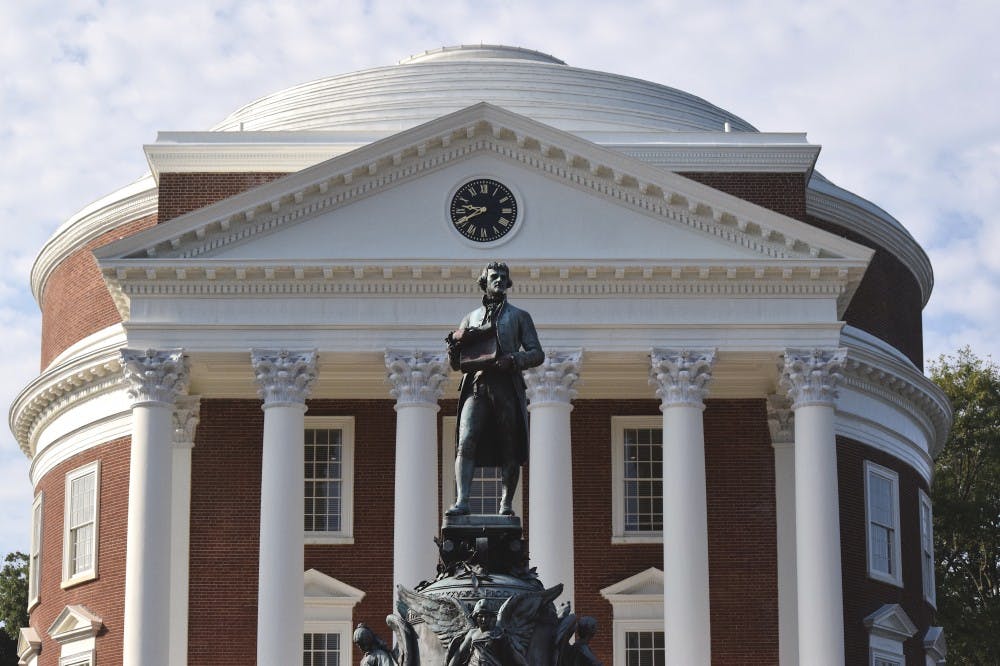As racial tensions continue to rise in the United States, many issues of debate have risen to the forefront. In recent weeks, self-proclaimed social activists across the nation have begun advocating for the desecration or destruction of monuments which honor men of the past. Many of these men were the architects and forefathers of our nation, but made some very questionable decisions, to say the least.
Here at the University, these activists are beginning to target the statue and legacy of Thomas Jefferson. A plan has already been proposed and hastily approved by our pliable Student Council, calling for the defilement of the Jefferson statue with a plaque preaching of our founding father’s symbolism as a white supremacist. I fear this action might be taken to remove or even destroy the statue in the near future, especially given recent events.
While I believe Jefferson’s checkered past must be documented and taught, I don’t think he should be demonized unequivocally, as he is only the natural product of a twisted era. Moreover, the influence of his accomplishments should not be abridged or erased, for without him, our nation would not be the exemplar of individual liberty and freedom that it is today.
Although Jefferson was exalted throughout his lifetime and after his passing, he is examined much more critically today. Based on our current moral compass, he was capable of both tremendous evil — most notably his ownership of slaves — as well as great good, such as the composition of the most important document in American history — the Declaration of Independence. However, the truth behind Jefferson’s morality requires an examination of nuance, not broad generalization.
When analyzing the integrity of individuals from ages long past, it is worth making an important consideration: the conditions of the eras from which they hail. As John Locke once said, “We are like chameleons, we take our hue and the color of our moral character, from those who are around us.” Oftentimes, individuals are simply products of the societies in which they were brought up. For instance, in today’s society racism and bigotry are largely met with criticism and vilification and, as a result, the proliferation of such behaviors has drastically reduced over time, as our moral standards have shifted in a positive direction.
However, in days past, racism was not only seen as acceptable, but was in fact the societal norm. Slavery was a part of everyday life — children were taught that it was justified, and the vast majority became embodiments of their morally skewed societies. Similarly nowadays, an average Bengali sweatshop worker makes about 21 cents per hour, and Americans have no qualms with purchasing products made by these modern-day slaves, many of whom are children. 200 years from now, would it make more sense for people to demonize us for contributing to this slave labor, or the institutions which allow this to happen? Like Jefferson, we were also raised in a society which accepts atrocities like this, but that doesn’t necessarily make us bad people.
Humanity has certainly come a long way since the 18th century, but individual human nature hasn’t changed much. We’re still the same old organisms which we were hundreds of years ago, capable of the same horrors. The only difference is that our societies and our perception of morality have matured — but it is clear that much progress still has to be made.
Jefferson was by no means a perfect man, but he did write a nearly perfect document — the Declaration of Independence, which laid the foundation for our great country. He also was an advocate for religious freedom, served as our third U.S. President and Secretary of State, doubled our nation’s size with the Louisiana Purchase and founded one of the greatest public universities in the country. Moreover, he was a consistent opponent of slavery for most of his lifetime, deeming it a “moral depravity” and a “hideous blot.” He drafted legislation which ended the importation of African slaves into Virginia and proposed laws which would later ban slavery in the Northwest Territories. He challenged the status quo which had been ingrained into the fabric of society for centuries, despite being raised to believe that those atrocities were justifiable.
If we are going to target moral standards from hundreds of years ago, let’s be critical of societies as a whole, not of the individuals who made them up. Moreover, I think our efforts would be better spent trying to improve our current civilization, rather than obsessing over the past. We should educate our youth about the mistakes which our country made, but to demonize those who were products of their era is wrong.
Milan Bharadwaj is a Viewpoint writer for the Cavalier Daily. He may be reached at opinion@cavalierdaily.com.







